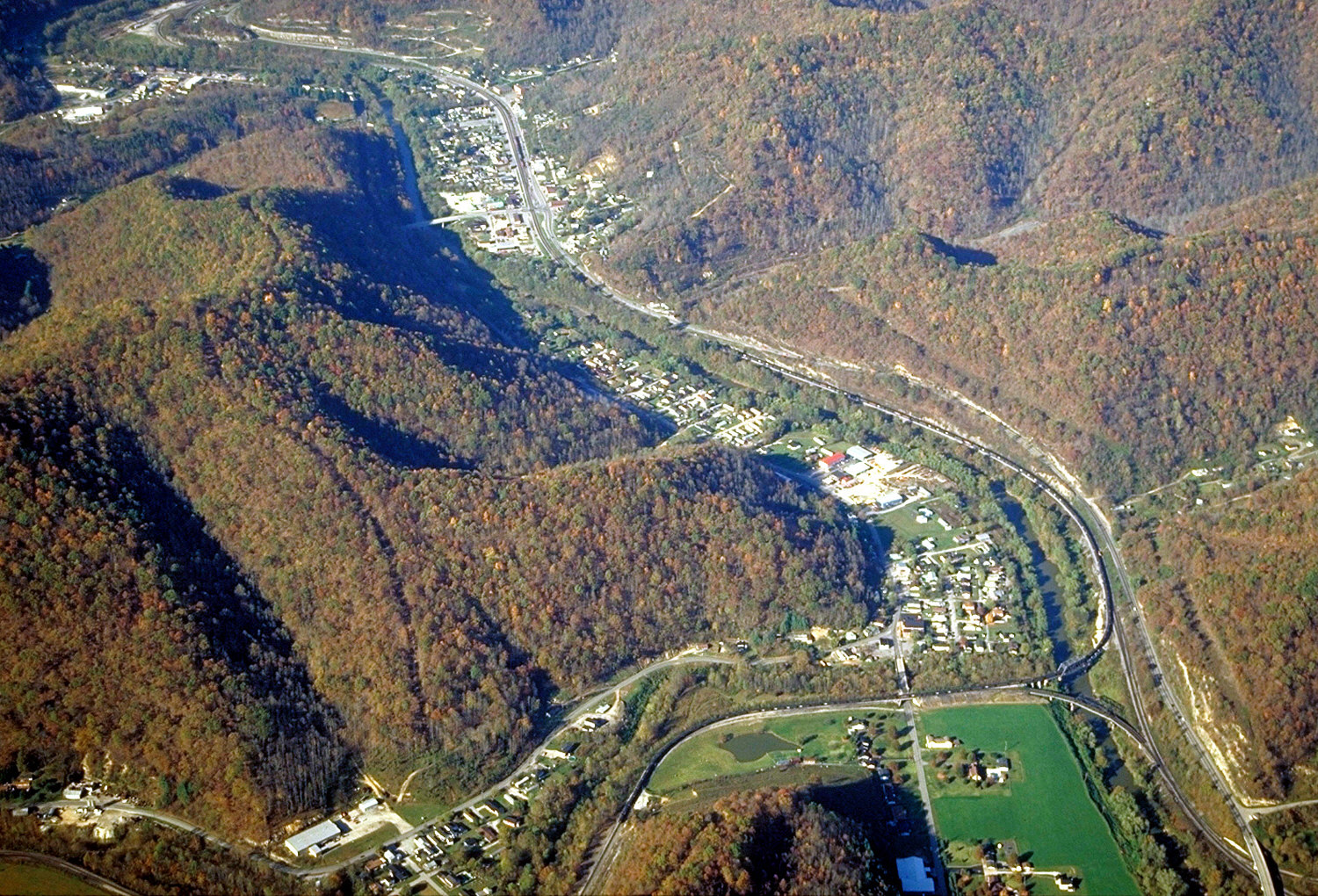State’s top lawyer opens inquiry into the management of the troubled Martin County Water District.

Martin County Water District draws water from the Tug Fork River, seen here near the town of Lovely, Kentucky. Photo courtesy of Wikimedia Commons
By Brett Walton, Circle of Blue
After nearly two decades of documented administrative, financial, and infrastructure failures at the Martin County Water District, the Kentucky Attorney General’s Office announced on June 4 that it will investigate the troubled water system that has become a symbol of botched management and the perilous condition of Appalachian drinking water.
“The Attorney General’s Office is opening an inquiry into the past and present management and operations of the Martin County Water District,” Attorney General Andy Beshear said in a statement. “Handling the inquiry for the office will be the Department of Criminal Investigations and the Office of Rate Intervention.”
The Department of Criminal Investigations oversees probes into corruption by public officials and misuse of public funds. The Office of Rate Intervention’s mandate is to guard residents against unfair utility bills.
The attorney general’s action coincides with a third investigation into the Martin County Water District being conducted by the Public Service Commission, the state government body that regulates utilities. The district provides water to roughly 9,500 people in the eastern Kentucky county.
Beshear’s statement indicated that his office’s inquiry will be an independent assessment but work with the PSC.
The Attorney General’s press office did not return phone messages seeking additional comment about the timing and scope of the investigation.
It is unclear at this point the direction the investigation will take, according to Mary Cromer, an attorney with the Appalachian Citizens’ Law Center. Cromer, who is representing Martin County Concerned Citizens, a civic pressure group, in the PSC case, sent Beshear a letter on May 30 asking for an investigation. The letter was co-signed by Food and Water Watch and the citizens’ group. Cromer hopes that the attorney general addresses a number of the group’s concerns about the district’s financial management, namely the use of grant money and spending by district employees.
“The fundamental issue with the water district is that they have received a lot of money in the last ten to fifteen years for capital improvements,” Cromer said, mentioning a $3 million payout around 2001 from a state fund. “It’s hard to see exactly where the money has gone.”
The Martin County water system has struggled since the 1990s. Bordering West Virginia, Martin County is confronted with a declining population, a poverty rate near 40 percent, and the weakening of the coal industry. The Public Service Commission noted in 2002 that the district’s network of pipes, intakes, treatment facilities, and pump stations was “in a general state of disrepair.”
A year later, the commission required the district to complete 43 actions that would restore adequate service. Actions ranged from inspections and repairs, to technical analyses and staff trainings, and a requirement to take customer complaints.
The fixes, by and large, were ignored. The PSC followed up with another investigation in 2006. A 2014 assessment found that the district had not implemented more than three dozen recommended actions.
“These things have really not changed at all,” Cromer told Circle of Blue.
Arguably, circumstances are even worse. In 2016, distribution pipes leaked almost two-thirds of the water that flows through them, according to the district’s annual report. Leak rates, which vary year-to-year, were around 60 percent in 2012 and 2013. The district frequently violates federal health standards for disinfection byproducts, exceeding limits for total trihalomethanes in the last 12 quarterly sampling periods, dating back to July 2014. Long-term exposure to these compounds, which are formed when chlorine reacts with organic matter in untreated water, may damage the liver, kidneys, or central nervous system and increase the risk of cancer.
Pipe breaks that allow groundwater to penetrate the system are another hazard, Cromer said. These intrusions occur after water leaves the treatment plant. Groundwater can introduce unsafe chemicals and bacteria, legacies of the region’s coal industry and inadequate sewage treatment.
Intrusions can also give the water an unappetizing color or taste. County residents trade pictures of cloudy, muddy, and darkened tap water on the Martin County Water Warriors Facebook group.
Many residents choose not to drink tap water at all; they instead rely on bottled water, which is an added cost.
Even if they don’t drink it, the price of tap water is going up.
On January 16 of this year, the water district asked state regulators to allow a 49.5 percent rate increase to cover the rising cost of fixing a failing system and patch financial holes that had the district at risk of shutting down within 60 to 90 days, claimed John Horn, chairman of the district’s Board of Commissioners. The district booked a net operating loss of $873,516 in 2016.
“Our financial status, to put it simply, is bleak,” Horn and other members of district’s newly appointed five-person board wrote in a Facebook post on January 12, when at least a thousand residents were without running water due to a broken pump at the treatment plant.
In March, the Public Service Commission rejected the district’s proposal, arguing that 26 percent was more appropriate. That money will go toward daily expenses like payroll and supplies. More aid is coming for repairs to the system’s hardware. District officials announced in February a $3.4 million federal grant for a new water intake and improvements to the district’s reservoir and treatment works, and a $1.2 million grant from the Appalachian Regional Commission to repair leaking pipes and broken meters.
The rate increase nonetheless struck residents as blatantly unfair, given the utility’s performance.
“Martin District’s request for an increase is extraordinary and comes at a time when the consumer’s confidence in the Martin District’s ability to manage its operations and its finances is very low,” Cromer wrote to the PSC on behalf of the Martin County Concerned Citizens.
But an increase is a better option than the alternative, the PSC argued — the potential shutdown of the water system for lack of operating funds.
Brett writes about agriculture, energy, infrastructure, and the politics and economics of water in the United States. He also writes the Federal Water Tap, Circle of Blue’s weekly digest of U.S. government water news. He is the winner of two Society of Environmental Journalists reporting awards, one of the top honors in American environmental journalism: first place for explanatory reporting for a series on septic system pollution in the United States(2016) and third place for beat reporting in a small market (2014). He received the Sierra Club’s Distinguished Service Award in 2018. Brett lives in Seattle, where he hikes the mountains and bakes pies. Contact Brett Walton




